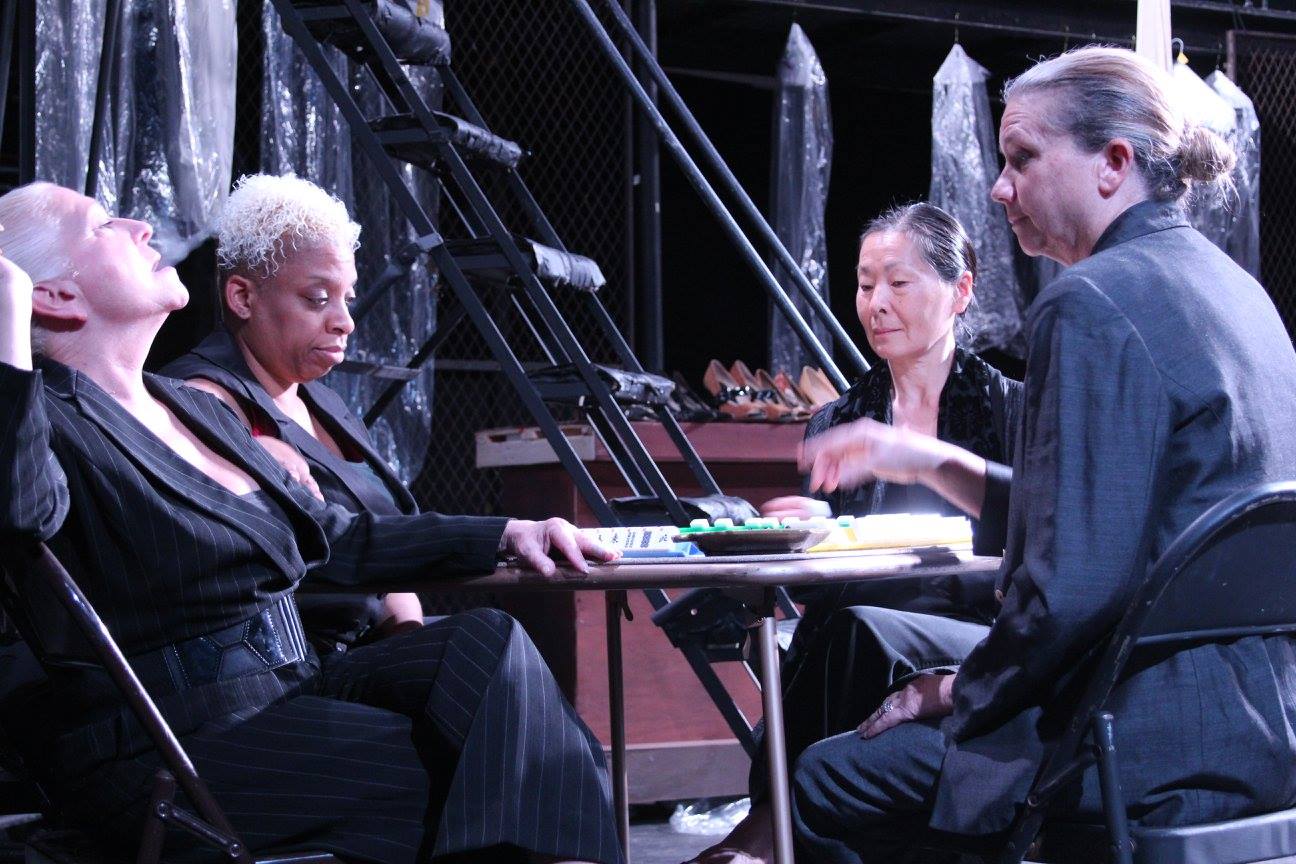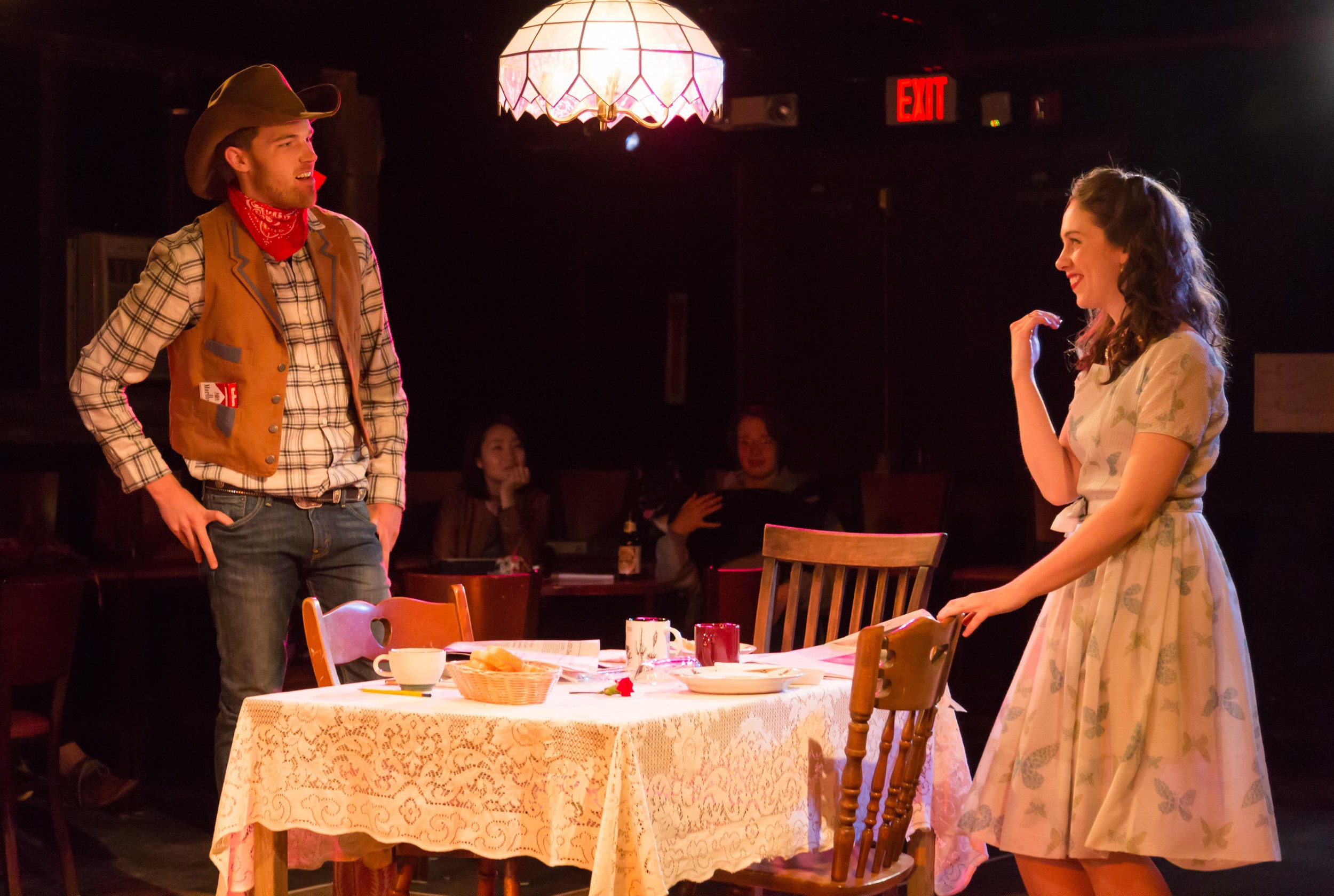Review of Shadow. Eurydice Says, at ARACA, New York
Elfriede Jelinek’s Shadow. Eurydice Says is not much of a drama, if by that is meant a presentation with a plot, distinct characters, and scenic development. Written as a block of more or less stream-of-consciousness text, the play might be staged as a long, self-involved monologue. In a recent staging at the ARACA Project, director Jessica Rizzo finds a way to create visual interest, conflict, movement, and distinct fluctuations of affect in Jelinek’s wordy diatribe. Nine actresses, designated in the program by letters, A-I, undertake the rigors of the text, scripted for different speakers by Rizzo and her dramaturg Ilinca Tamara Todorut. The way different speakers handle different “voices” in the text amounts to a dramatic interpretation and works as the interplay of an expanded classical chorus. A chorus with different personalities and obsessions and appearances, but all, somehow, Eurydice. Rizzo and Todorut have imagined an interplay that we are left to interpret as we will.
The cast of Shadow. Eurydice Says.
The entire production is a women-only affair, and that’s much to the point, for what Jelinek’s Eurydice contemplates most emphatically is a world without men, where the presence and perspective of males can finally be considered irrelevant. Left to the shadowy kingdom of Hades after “the singer”—her husband Orpheus—failed to rescue her, Eurydice—a kind of collective presence evoked by all the women on stage in turn—embraces an attenuated life that, paradoxically, she views as a fulfillment.
Written when Jelinek, now 70, was in her late sixties, Shadow. Eurydice Says, reads primarily as a lyrical “goodbye to all that” of a woman aged well beyond youthful concerns. Many of the speeches return again and again to drops in inspiration, to the affront of the screaming girls who still follow the thrilling song of the singer, to the way in which a post-menopausal life offers a unique experience in the feminine life-cycle. Jelinek, a writer who certainly has her own way with sexual language, makes Eurydice somewhat bawdy at times, and her evocation / denigration of “the singer” plays into the kind of disenchantment that might greet a mythic figure in the modern world or, indeed, a once popular performer past his prime. Jelinek’s text cleverly plays on our contemporary associations with singers as heart-throbs—such as Sinatra, Elvis, and the boy bands of more recent vintage—capable of stirring screaming, barely pubescent girls. Eurydice looks askance at all that hot lust even as she keeps mentioning it in a manner that begins to feel rather auto-erotic, if bitterly so.
D (Susan Brickell), H (Azusa SHESHE Dance), E (Cho Young Wiles), I (Eloise Harris-Damone)
The different aspects of Eurydice are dramatized by groups formed among the nine actresses (which happens to be the traditional number of muses in Greek mythology). As the show opens, four sit at a table playing Mahjong, with E (Cho Young Wiles) seeming to voice what I took to be Jelinek’s perspective, if only because she mentions, more than once, “my pen” and being a poet. Above, on a catwalk, G (Arianne Recto), the youngest of the nine, looks on, and, as her trance-like movement, arms outstretched, seems to indicate later in the play, she may be the one most vulnerable to the singer’s return.
The other four seem most concerned with the racks of clothes that comprise the set. Jelinek’s prose is at its most poetic in recalling, with nostalgia and a sense of promise, the clothes of yesteryear. If, as the old saying goes, “clothes make the man,” that seems to be even more true of woman. A deep melancholy comes into the text at several points but perhaps never more touchingly than in these women mourning the things they’ll never wear again. Fashions change, and that may in itself create anxiety and pity, but even more do those emotions inflect one’s willingness to embrace the new or to face how old one’s former glad rags have become. A (Mary Round) and B (Kathleen Dimmick) seem the most smitten with the change of being that a change of wardrobe may suggest.
I (Eloise Harris-Damone), A (Mary Round), B (Kathleen Dimmick)
A phrase that occurred to me more than once in the course of the 80 minutes of more or less steady verbiage was “methinks the lady doth protest too much.” Uttered in Hamlet by Queen Gertrude to express her skepticism about a queen’s lines in a play, asserting that she would never marry again after being widowed, the lines apply as well to Eurydice’s Shade insisting that, as Hamlet says of his middle-aged mother, “the heyday in the blood is tame.” Hamlet’s words may be presumptuous—after all, at thirtysomething, what does he know about it?—but Jelinek’s Eurydice seems willing to ascribe to that view, if only some dim memory of what having a body means didn’t keep sneaking up on her.
above: G (Arianne Recto); below: I (Eloise Harris-Damone), E (Cho Young Wiles)
Along those lines, one of the best sequences in Rizzo’s production is a collective dance among the women as they begin to feel, once again, all that the singer’s song once betokened. Indeed, there are moments in the torrent of words to suggest that the insistent song of arousal has a will of its own, quite independent of which gender is singing and which listening.
Against these juicier moments, there is often a bitter invective aimed at those sweetly vain young girls asserting the first flush of desire and being desired. Jelinek’s Eurydice, rather than seeing herself cyclically recalled in such blossoms—as many a male writer would have it—sees rather her own emphatic obsolescence. If not, strictly speaking, misogynistic, Eurydice’s disdain for the young girls certainly seems like Ephebiphobia.
The worst aspect of the show, for the listener, is that Jelinek’s song of the Shadow is often too unvarying, becoming as repetitive as any doddering mind in its orbit of obsessions. Things once said get said again and again. Rizzo and company do wonders with varying the rhythms of the flow, matching it to distinct groupings and, for the final spiraling down, poetic lighting effects by Elizabeth Green. It may be that “the rest is silence,” but in any case, the silence, when it comes, is a welcome rest.
E (Cho Young Wiles)
Shadow. Eurydice Says
By Elfriede Jelinek
Translated from the German by Gitta Honegger
Directed by Jessica Rizzo
Scenic Designer: An-Lin Dauber; Lighting Designer: Elizabeth Green; Dramaturg: Ilinca Tamara Todorut; Assistant Director: Laura Petree; Technical Director: Jill Salisbury; Stage Manager: Elizabeth Emanuel
Cast: Susan Brickell, Azusa SHESHE Dance, Mollie Collison, Kathleen Dimmick, Eloise Harris-Damone, Josephine Pizzino, Arianne Recto, Mary Round, Cho Young Wiles
The ARACA Project
The John Cullum Theater at the American Theatre for Actors
314 West 54th Street, New York, NY
October 12-14, 2017
















